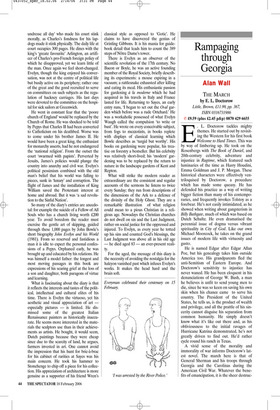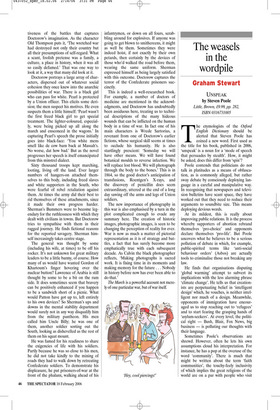Rampaging through Georgia
Alan Wall
THE MARCH by E. L. Doctorow Little, Brown, £11.99, pp. 367, ISBN 0316731986 ✆ £9.59 (plus £2.45 p&p) 0870 429 6655 E. L. Doctorow tackles mighty themes. He started out by revisiting the Western for his first book Welcome to Hard Times. This was by way of limbering up. He took on the Rosenbergs with The Book of Daniel, and 20th-century celebrity, adventure and injustice in Ragtime, which featured such luminaries of the time as Harry Houdini, Emma Goldman and J. P. Morgan. These historical characters were effectively ventriloquised by Doctorow, a procedure which has made some queasy. He has defended his practice as a way of writing bigger fiction than many of his contemporaries, and frequently invokes Tolstoy as a forebear. He’s not easily intimidated, as he showed when writing about gangsterism in Billy Bathgate, much of which was based on Dutch Schultz. He even dramatised the perennial issue of dogma versus vibrant spirituality in City of God. Like our own Michael Moorcock, he takes on the grand issues of modern life with virtuosity and gusto.
He is named Edgar after Edgar Allan Poe, but his genealogy takes him outside America too. His grandparents fled the anti-Semitism of Eastern Europe. And Doctorow’s sensitivity to injustice has never waned. He has been eloquent in his denunciations of George W. Bush, a man he believes is unfit to send young men to die, since he was so keen on saving his own skin when his chance came to serve his country. The President of the United States, he tells us, is the product of wealth and privilege, and all the prattle of his sincerity cannot disguise his separation from common humanity. He simply doesn’t know what it’s like out there and, as his obliviousness to the initial ravages of Hurricane Katrina demonstrated, he’s not greatly driven to find out. He’d rather cycle round his ranch in Texas.
A vivid sense of the morality and immorality of war informs Doctorow’s latest novel. The march here is that of General Sherman and his troops through Georgia and the Carolinas during the American Civil War. Whatever the benefits of emancipation, it is the sheer destruc tiveness of the battles that captures Doctorow’s imagination. As the character Old Thompson puts it, ‘The wretched war had destroyed not only their country but all their presumptions of self-regard. What a scant, foolish pretense was a family, a culture, a place in history, when it was all so easily defamed.’ That was one way to look at it, a way that many did look at it.
Doctorow portrays a large array of characters, dispersed out of whatever social cohesion they once knew into the anarchic possibilities of war. There is a black girl who can pass for white. Pearl is protected by a Union officer. This elicits some derision; the men suspect his motives. He even suspects them a little himself: ‘Pearl wasn’t the first freed black girl to get special treatment. The lighter-coloured, especially, were being picked up all along the march and ensconced in the wagons.’ In capturing Pearl’s speech the prose initially goes into black-face: ‘You white mens smell like de cow barn back at Massah’s. No worse, dat how bad.’ But as the novel progresses her speech is itself emancipated from this minstrel dialect.
Sixty thousand troops kept marching, looting, living off the land. Ever larger numbers of hangers-on attached themselves to this body, including freed slaves and white supporters in the South, who were fearful of rebel retaliation against them. At times the army did their best to rid themselves of these attachments, since it made their own progress harder. Sherman’s Bummers were to become legendary for the ruthlessness with which they dealt with civilians in towns. But Doctorow tries to sympathise with them in their ragged journey. He finds fictional reasons for the reported savagery. Sherman himself increasingly takes centre stage.
The general was thought by some (including his wife, at times) to be off his rocker. It’s not unknown for great military leaders to be a little barmy, of course. How many of us would have wanted Gordon of Khartoum’s finger hovering over the nuclear button? Lawrence of Arabia is still thought by some to be a bit on the rum side. It does sometimes seem that bravery can be positively enhanced if you happen to be a sandwich short of a picnic. What would Patton have got up to, left entirely to his own devices? So Sherman’s ups and downs in the mental stability department would surely not in any way disqualify him from the military pantheon. His men called him Uncle Billy; he was one of them, another soldier sorting out the South, looking as dishevelled as the rest of them on his squat mount.
He was famed for his readiness to share the exigencies of life with his soldiers. Partly because he was so close to his men, he did not take kindly to the mining of roads they had to walk down by retreating Confederate soldiers. To demonstrate his displeasure, he put prisoners-of-war at the front of the phalanx, walking ahead of his infantrymen, or down on all fours, scrabbling around for explosives. If anyone was going to get blown to smithereens, it might as well be them. Sometimes they were indeed hoist, if not exactly by their own petards, then certainly by the devices of those who’d walked the road before them, wearing the same uniform. Sherman expressed himself as being largely satisfied with this outcome. Doctorow captures the terror of the Confederate prisoners succinctly.
This is indeed a well-researched book. For example, a number of doctors of medicine are mentioned in the acknowledgments, and Doctorow has undoubtedly been assiduous here, treating us to technical descriptions of the many hideous wounds that can be inflicted on the human body in a time of war. In fact one of his main characters is Wrede Sartorius, a revenant from one of Doctorow’s earlier fictions, whose surgical skill seems at times to occlude his humanity. He is also startlingly prescient: ‘Someday we will have other means. We will have found botanical moulds to reverse infection. We will replace lost blood. We will photograph through the body to the bones.’ This is in 1864, so the good doctor’s anticipation of transfusions, Roentgen’s X-rays, and the discovery of penicillin does seem extraordinary, uttered at the end of a long day sawing off the arms and legs of Union soldiers.
The new importance of photography in this war is also emphasised by a turn in the plot complicated enough to evade any summary here. The creation of historic images, photographic images, is seen to be changing the perception of reality for ever. War is now as much a matter of pictorial representation as it is of strategy and battles, a fact that has surely become more emphatically true with each subsequent decade. As Calvin the black photographer reflects, ‘Making photographs is sacred work. It is fixing time in its moments and making memory for the future . . . Nobody in history before now has ever been able to do that.’ The March is a powerful account not merely of one particular war, but of war itself.



















































































 Previous page
Previous page